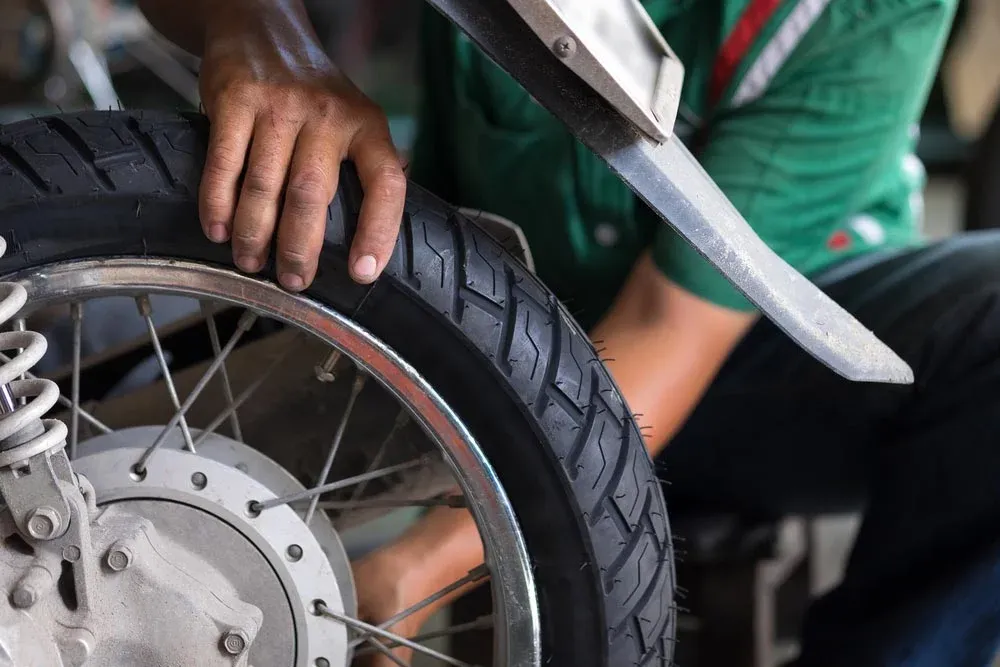Understand the differences between spoke wheels and alloy wheels for motorcycles. Learn which option suits your riding style and preferences for optimal performance.
Wheel wisdom: Deciding between spoke wheels and alloy wheels for your bike
The wheels of your bike play a crucial role in its performance, safety, handling, and terrain compatibility. In India, bike manufacturers mainly use two types of wheels – spoke wheels and alloy wheels. Choosing between a spoke wheel, an old-school technology-based, or an alloy wheel is an important decision for any bike enthusiast to ensure safety and performance. Choosing the right wheel can also influence your bike insurance policy premium. This article helps you learn the difference between spoken and alloy wheels to understand suitability and choose the right wheel.
What are spoke wheels?
Spoke wheels are traditional, based on old-school technology, mainly used in bicycles and bikes. Most bikes had spoked wheels before the 1970s when the alloy wheels were introduced. Spoke wheels comprise spokes, hubs, and rims that provide stability and strength. Spoke wheels remain popular for their resilience and ability to absorb shock, making them suitable for various terrains. Spoke wheels are also easy to repair by replacing the individual spokes if there is any damage.
What are alloy wheels?
Alloy wheels for bikes are new-age wheels based on the tubeless system. They are made from aluminium or magnesium alloys that enhance strength compared to traditional steel wheels. These wheels are often used in high-performance bikes, such as road or mountain bikes, where weight reduction is critical for improved speed and agility.
Spoke wheels vs alloy wheels
Understanding the difference between spoke and alloy wheels is important to make the right choice. Let us look at the differences (spoke wheels vs alloy wheels) based on various factors.
Factors | Spoke wheels | Alloy wheels |
Construction | Spoke wheel construction uses a material like spokes made of steel, a hub, and a rim that are made of steel or alloy. | Alloy wheels are manufactured using aluminium or magnesium alloys. |
Strength | Spoke wheels provide strength and resilience, capable of handling impacts well due to the sturdy construction of the spokes. They are suitable for off-road or rugged riding conditions as they can withstand rough terrain well. | It contributes to improved performance in terms of speed as it can enhance strength while being lightweight. |
Weight | Generally heavier due to the steel construction of the spokes and rims. | It weighs less as lightweight alloys are used for construction. |
Corrosion resistance | Spokes and rims are susceptible to corrosion over time | Generally, alloy wheels offer long-term durability even in harsh conditions as they are more corrosion-resistant. |
Flexibility | Spoke wheels offer flexibility in design and construction, allowing for customisation and repairability. | Alloy wheels are generally not adjustable, but the entire wheel construction is optimised for performance. |
Design | Spoke wheels have a retro look and classic traditional appearance with visible spokes. | Alloy wheels have a modern aesthetic look and sleek appearance with no visible spokes. |
Cost | Simpler construction and materials used make them more affordable. | Using expensive materials and advanced manufacturing processes makes alloy wheels more expensive. |
Fuel efficiency | Due to the additional metal spokes, spoke wheels typically weigh more than alloy wheels. This can slightly(minimally) reduce fuel efficiency. | Alloy wheels can improve fuel efficiency as they are lighter in weight. |
Conclusion
To sum up, choosing between spoke and alloy wheels can depend on terrain, riding preferences, and maintenance considerations. Irrespective of wheel type, bike insurance with add-ons like tyre cover can ensure complete financial protection.

Get Quick Quote


